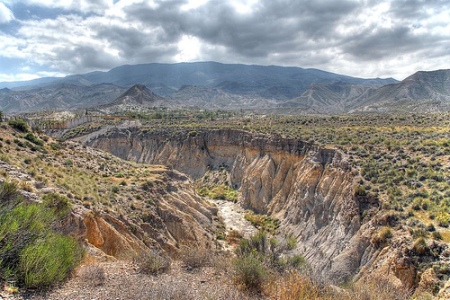The fight against desertification
And this is not a fight that we seem to be winning…
This problem affects nearly one quarter of the earth’s land area and about one sixth of the world’s population.
The worst-hit areas are sub-Saharan Africa and Central Asia. Globally, desertification costs an estimated $65 billion a year in lost income.
To discuss ways to stop it, more than 2,000 delegates from 191 countries around the world have gathered in Madrid for the eighth session of the Conference of the Parties to the United Nations Convention to Combat Desertification (UNCCD).
The meeting began last Monday (September 3) in the Spanish capital and ends next Friday (September 14). It includes the presentation of a ten-year plan aimed at helping preserve the livelihoods of millions of the world’s poorest people.
The gathering comes amid a flurry of international attention on the environment.
The week before last, delegates from 158 nations gathered in Vienna to consider steps toward agreeing a new climate pact to replace the UN’s Kyoto Protocol. And, later this month, there will be a major gathering on climate change both at the UN in New York and one in Washington hosted by U.S. President George W. Bush.
Causes of desertification
As for desertification, climate change is seen as just one of several causes of a ravaging process that quickly transforms arable soil into dry wasteland.
One key cause is modern agricultural practices. Modern farming requires massive amounts of water. That depletes underground aquifers, which are often then filled by seawater. That salinized soil then requires chemical fertilizers to hold onto water. Those chemicals do their own damage to the land, further stripping its ability to absorb rainfall.
Over time, the soil becomes so depleted that it becomes parched desert. And it’s happening around the world, from the Aral Sea to the Mediterranean to North America.
Unless action is taken to curb the problem, the UN warns that some 50 million people could be displaced by desertification within the next decade.
Experts in Madrid will be looking for ways to implement land management policies that protect existing flora from overgrazing and unsustainable irrigation practices. After all, it’s easier and much cheaper to prevent the problem than it is to fix it after once-rich land has been transformed into desert.
The host country is extremely sensitive in this regard. Nearly one-third of Spain’s roughly 200,000 square miles faces a “significant risk” of desertification, making it one of Europe’s most affected nations, according to the Spanish environment ministry.

Tabernas desert (Almeria, Spain) The only real desert in Europe
Originally uploaded by cuellar
Spain has proposed that the European Union set up a Center for the study of drought and desertification in the city of Barcelona, building up the capacity of an existing center to study the same problems.
As part of its compromise to fight desertification, Spain has already agreed to start managing this year an alert system to forecast sandstorms in the Sahara and Maghreb area with up to five days warning.
The country is also building an all-Spanish satellite that will have as one of its specific missions weather observation. It will be part of the Global Monitoring for Environment and Security European initiative. The current operating satellites in the joint endeavor are proving immensely useful in obtaining reliable and timely information about the state of our world. (See here, for example, its capabilities put to use in the aftermath of a summer forest blaze in Guadalajara. It allows for an adequate measurement of the ecological damage).
As for seeing the glass half-full, maybe we can reflect on an example used by Jared Diamond in his splendid book Collapses. He explains how some societies were on the verge of ecological collapse but did recover. One such case is Japan. Japan almost destroyed its forests, but quickly realized its mistake and went on an intensive reforestation program. It also helped that Japan is a country with great respect and admiration for its natural environment. It will take bold leaders and a conscious effort from all members of our societies, though.
Explore posts in the same categories: EnvironmentTags: climate change, climate warming, desertification, droughts, ecological disasters, Environment, forest fires, soil loss
You can comment below, or link to this permanent URL from your own site.
September 10, 2007 at 8:45 am
[…] https://technology4life.wordpress.com/2007/09/09/the-fight-against-desertification/ […]